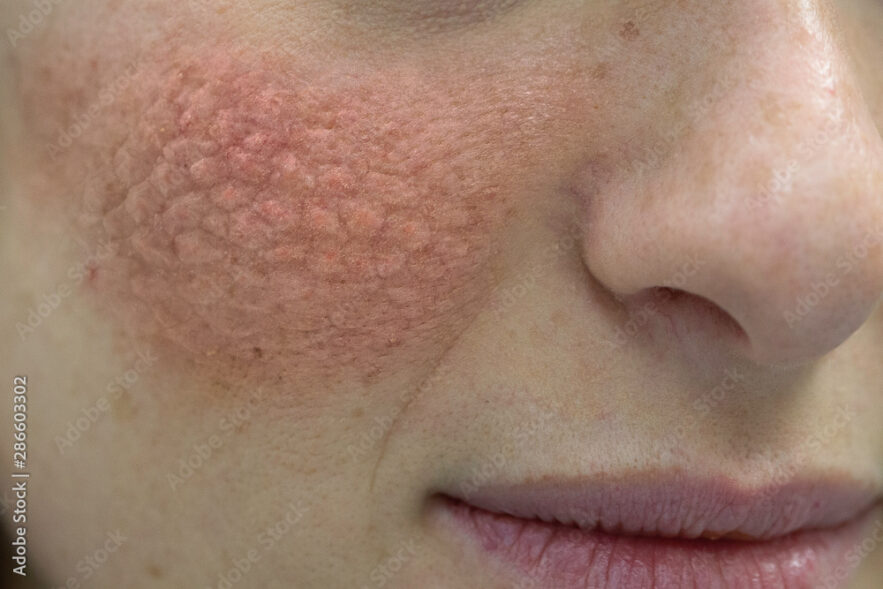It took seven years for Madeline Shonka to be diagnosed with lupus. Unfortunately, her struggles didn’t end there.
The side effects of medications for lupus that her healthcare providers prescribed were often debilitating side effects, such as weight gain, rashes and even difficulty managing anger. Then, over time, her physicians tested different, better-suited treatments on Shonka. She found that certain new habits, like light exercise, made a big difference in her quality of life. She then founded Co-immunity, which hosts support groups for patients with chronic illnesses, so that they can share their experiences.
What Is Lupus?
Lupus is an autoimmune disease, which means your body’s immune system malfunctions and attacks its own tissue. It does this by manufacturing too many B cells, a type of immune cell, which go on to attack your healthy tissue. It can attack joints, skin and more. The most common type is systemic lupus erythematosus (SLE), which can affect many parts of the body and cause myriad symptoms, including:
- Rashes
- Fevers
- Fatigue
- Joint pain
- Arthritis
- Sun sensitivity
- Heart and kidney problems
- Seizures
- Psychosis
- Respiratory problems
There are also cutaneous lupus, in which the skin reacts to sunlight by forming rashes or lesions and drug-induced lupus, which happens when the immune system reacts poorly to certain medicines. Stopping the medicine that triggered the flare should calm symptoms, but it may be difficult to recognize since symptoms can emerge months or years after taking a particular medication.
Diagnosis and Cause of Lupus
Because lupus can cause such varied symptoms for individuals, it can be challenging to recognize and diagnose. Your physician might need to do a combination of blood and urine tests along with a chest X-ray or a skin biopsy to pinpoint the cause.
Tracking Triggers of Lupus Flares
There is no way to cure lupus, so the goal of any treatment plan is to manage the disease and reduce flares—periods of days or weeks during which your symptoms worsen. One of the best ways to do this is to keep a trigger journal, tracking what you eat, how you feel, your level of stress and whether your symptoms flared. This can help you identify certain foods or conditions (like sunlight or stress) that might trigger your systems. That way, you can do your best to avoid them. Some common triggers include:
- Stress
- Exposure to sunlight
- Infection
- Injury
- Other types of medicines
Lifestyle Changes That May Alleviate Lupus Symptoms
In addition to avoiding triggers like excess stress, certain foods and intense sunlight, some lifestyle changes may help minimize your symptoms. For Shonka, moving around every day is crucial to maintain her well-being. As a result of the lupus, she has arthritis flare-ups that can make it hard for her to participate in strenuous exercise. She used to resent the symptoms that prevented her from getting in her regular workouts, so she stopped being physically active for a time. She quickly learned that “if you don’t use it, you lose it.” Nowadays, she says, “I am staying physically active on purpose. It doesn’t necessarily need to be working out, just moving your body in some way.” On the day she spoke to MedShadow, she said she was in the midst of a flare-up. While she often prefers a more intense workout, when she’s in pain, even just a brief walk can help. “That’s what I’m able to do,” she adds, “and it gets me outside. It’s something to clear my head and distract me.”
If your lupus flares up in the sunlight, your healthcare provider might suggest that you take vitamin D supplements, since reducing your exposure to the sun may also limit your body’s ability to produce the vitamin.
To reduce stress, you might consider yoga, meditation, breathing exercises, finding a support group of people who understand your condition or asking for help from friends, family or even coworkers when you need it. Seeing a therapist can help you develop healthy boundaries and effective mechanisms to cope with stress.
Finding a support group can also help. “So much of chronic illness, especially lupus, is flared by stress. And when you don’t have a good support system that understands what you’re going through, it can be really difficult to cope,” says Shonka.
Learn about Noehmi’s experience with lupus symptoms, treatments, side effects and the lifestyle changes she’s made to help manage it.
@medshadow_foundation A patient story of lupus and miscarriage, featuring Noehmi. #lupus #lupusawareness #autoimmunedisorder #autoimmunecondition #lupuswarrior #pregnant #pregnancy #misscarriage #miscarriage #abortion #autoimmuneawareness #health #healthylifestyle #vegan #vegantok #vegetarian #womenshealth #women #healthtok #lupusfighter #medical #medication #diuretic #medshadow #medshadowfoundation ♬ Sad and lyrical background music(841790) – Sounds M
Lupus Treatments and Side Effects
NSAIDS: You can purchase nonsteroidal anti-inflammatory (NSAIDS) drugs, such as over-the-counter (OTC) ibuprofen without a prescription. These drugs may help relieve pain due to inflammation during lupus flare-ups. It’s important to take the lowest dose you can for the shortest time possible, until your symptoms improve because the risks of stomach ulcers, diarrhea and, even occasionally kidney dysfunction and cardiovascular disease associated with NSAIDS, increase the longer you take them. Some common drugs, like blood thinners, can interact with NSAIDs exacerbating the risk to your kidneys or of gastrointestinal bleeding.
Corticosteroids: If a flare-up is severe enough that it can’t be managed with NSAIDs alone, your healthcare provider may recommend corticosteroids, which can help reduce swelling and pain by suppressing your immune system. According to the Centers for Disease Control and Prevention (CDC), once your symptoms begin to fade, your healthcare provider should gradually lower your dose. That’s because the longer you take steroids, the more dangerous it can be to stop taking them. Quitting abruptly can cause withdrawal symptoms, including pain, nausea, fatigue and lightheadedness. The longer you’re on corticosteroids, the higher your risk of side effects, such as gastrointestinal irritation, weakening bones and even psychological effects. However, some people are prescribed corticosteroids to take continually to prevent flare-ups as well.
Patient Experience: Shonka’s doctor prescribed steroids even before knowing she had lupus. She says the drugs have caused myriad side effects and can even make her flare more, despite the fact that it helps alleviate her arthritis. The drugs increased her appetite and caused her to gain weight. She also experienced mood changes and felt angry and irritable more often.
The weight gain worsened Shonka’s arthritis, so exercise and healthy eating were important. Rather than feel hungry all the time, Madeline coped with the food cravings by making sure she always had access to healthy and low-calorie snacks.
BLyS-Specific Inhibitors: GlaxoSmithKline developed Benlysta (belimumab). In March 2011, it was the first treatment approved specifically for lupus patients. If you have lupus, your immune system makes extra B cells, which end up attacking your healthy tissues. Belimumab prevents your body from making too many of these cells. B cells are also known as B lymphocytes, a type of white blood cell of the lymphocyte subtype.
Your provider administers the drug either as an injection under the skin or an infusion directly into your veins.
According to a 2021 Cochrane Review, an analysis of several studies on the use of belimumab to treat lupus, 30% of people who took belimumab were able to reduce their corticosteroid dose by 50%. However, those who were given the drug rated their quality of life about the same as those who were treated with placebos, suggesting that supplementing the steroid dose didn’t necessarily make them feel any better. Still, lowering the dose of steroids could still reduce risk of steroid side effects later in life. The same analysis suggested that the drug caused few side effects.
According to the clinical trials, the most common side effects of belimumab were gastrointestinal symptoms (diarrhea, nausea), fevers, bronchitis, insomnia, depression, migraines, sore throats and injection-site reactions.
Hydroxychloroquine: Hydroxychloroquine is an antimalarial that works by lowering the levels of antibodies in your blood that attack healthy tissues. It can also help with pain, inflammation and skin irritation. Some people with lupus are prescribed antimalarials long term. Nausea, vomiting, rash and hyperpigmentation of the skin are common side effects, too. Less common is eye damage, which is rare and tends to occur in patients, who have been prescribed the drug for over 10 years.
Patient Experience: Of the various treatments, Shonka was prescribed, antimalarials seemed to cause the least intense side effects. She says she experienced about three months of mild nausea on the treatment.
Anticoagulants – Lupus can raise your risk for blood clots, so your healthcare provider may also prescribe blood-thinning drugs to prevent heart attacks and strokes.
Immunosuppressants: Immunosuppressants dampen your immune system, so it’s less able to attack your healthy tissues. They’re often a last resort for people with lupus, because its side effects are severe enough that their hearts, lungs, kidneys or even brains are damaged or at risk. Like BLyS-specific inhibitors, they may also be prescribed to allow you to reduce your corticosteroid dose. Examples of immunosuppressive drugs are Rheumatrex (methotrexate), Cellcept (mycophenolate mofetil), Imuran (azathioprine), Cytoxan (cyclophosphamide) and Lupkynis (voclosporin).
A common and dangerous side effect of immunosuppressants is an increased risk of infections. Because the drugs weaken your immune system, you may struggle to fight off bacteria and viruses that might not normally pose a major risk to your health. If you’re taking immunosuppressant drugs, it’s even more important that you wash your hands regularly and avoid contact with people who may be infected with influenza, Covid-19 or even common colds. To avoid infections, take care to thoroughly wash any scrapes or cuts.
In the long term, immunosuppressants may raise your risk for cancer. You also need regular blood tests to ensure you have enough red and white blood cells. It sometimes takes weeks or months for immunosuppressants to dampen your immune system. After you’ve been taking them for several weeks, you may start to experience stomach pain.
Patient Experience: A doctor prescribed Shonka methotrexate, but she took it for only six months. “I threw up three times a day,” she says. “I still have food aversions, because I was so nauseous all the time.”
CAR-T Immunotherapy (experimental): In August 2021, doctors treated a 20-year old woman with lupus who hadn’t responded to immunosuppressants or other treatments with a new type of therapy typically reserved for those with cancer. For chimeric antigen-receptor T (CAR-T) cell therapy, scientists extract a specific type of immune cells (T cells) from patients and reprogram them in the lab so that they recognize specific proteins on the outside of certain cells and attack them. Typically, the personalized treatment targets the cells found in an individual’s tumor or cancer, but in this case, the researchers engineered the T cells to attack the body’s own dysfunctional B cells. The woman’s symptoms abated five weeks after she received the treatment, and blood tests suggested she was in remission. By September 2022, doctors reported treating a total of five patients with the new therapy, all of whom were in remission three months later. The treatment is so new that it’s unclear how long it will last. There’s a chance it could act as a cure or that you may need to repeat treatment.
The first person to receive CAR-T for lupus did not report any side effects, but some of the next five experienced mild cytokine release syndrome, a condition in which your immune system responds more strongly than necessary to the immunotherapy, causing fevers, headaches and other flu-like symptoms. More severe episodes of cytokine release syndrome can cause difficulty breathing, organ failure and death. You can read more about immunotherapies such as CAR-T cell therapy for cancer here.
Questions to Ask Your Provider
- What is the goal of this specific treatment?
- What side effects might I experience?
- How will it interact with my other treatments (including OTC drugs and herbal supplements)?
- How long should I take this drug? Days? Weeks? Months?
- If I experience side effects, will they go away if I stop taking the drug?






